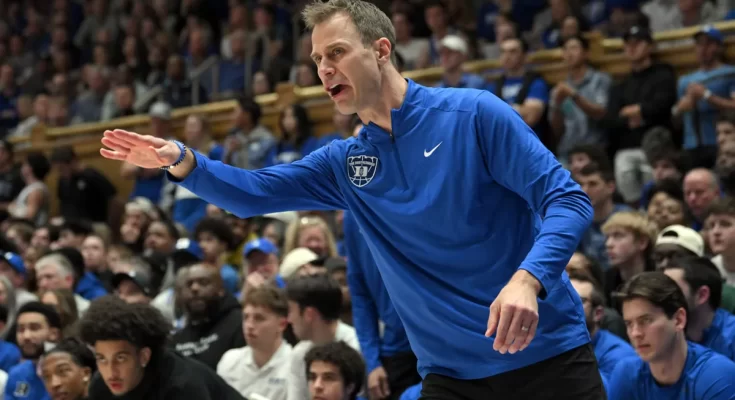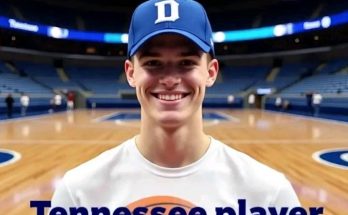Jon Scheyer’s $8.6 Million Endorsement Deal: A Game-Changer for College Basketball?
In a startling and unprecedented development, ESPN has reported that Jon Scheyer, the head basketball coach at Duke University, has secured a massive $8.6 million endorsement agreement. This eye-catching news sent shockwaves through the sports world, particularly the college basketball community, where such endorsement deals for coaches are rarely publicly reported — especially at this magnitude.
The deal signals a new era for college basketball coaches as figures of immense marketability, blurring the lines between amateurism and professional sports. But who exactly is Jon Scheyer, what is the context behind this endorsement agreement, and what could it mean for the future of college basketball and collegiate sports in general? Let’s explore these questions in depth.
Before delving into the endorsement deal itself, it’s important to understand who Jon Scheyer is, both as a person and as a coach.
Jon Scheyer is no stranger to the Duke basketball family. A former standout player for Duke University, Scheyer was an integral part of the 2010 NCAA Championship-winning team. His leadership and basketball IQ were lauded throughout his playing days, qualities that have carried over into his coaching career. After a brief professional career overseas and in the NBA developmental leagues, Scheyer returned to Duke as an assistant coach under the legendary Mike Krzyzewski (Coach K).
When Coach K retired at the end of the 2021-2022 season, Jon Scheyer was named the head coach of one of the most storied programs in college basketball history. This transition was closely watched by the basketball world, and Scheyer’s ability to maintain Duke’s competitive edge while upholding the program’s values has been a focal point.
According to ESPN’s report, Jon Scheyer’s endorsement deal totals $8.6 million — an eye-popping figure, especially in the context of college basketball coaching contracts and endorsement deals.
What makes this deal particularly notable is the nature and size of the endorsement compared to previous deals for college coaches. While top college coaches, especially in football and basketball, have secured lucrative salaries and some endorsements, this agreement seems to be one of the largest reported endorsements for a coach in NCAA basketball history.
The exact details of the endorsement — the company or brand behind it, the length of the deal, and the scope of Scheyer’s commitments — have not been fully disclosed. However, insiders suggest that the endorsement spans multiple platforms and marketing channels, including digital, broadcast, and possibly apparel or equipment partnerships.
This deal highlights how college basketball coaches are now being viewed not only as sports leaders but as marketable personalities with influence that extends beyond the court.
The significance of this endorsement deal extends beyond just the dollar figure. It represents a shift in how college sports are evolving in the era of Name, Image, and Likeness (NIL) rights and increasing commercialization.
- The Rise of Coaches as Marketable Figures
Traditionally, college coaches have been paid handsomely, but endorsements were mostly reserved for players or professional athletes. Scheyer’s deal suggests that coaches are becoming marketable personalities in their own right. Their image and reputation can be leveraged for brand partnerships, reflecting their influence on and off the court.
- NIL and College Sports Commercialization
The NCAA’s adoption of NIL rights in 2021 allowed college athletes to profit from their personal brands. While the policy primarily affects players, the ripple effects extend to coaches and other staff, who can now also engage in endorsement activities more freely. Scheyer’s deal is one of the clearest examples of this new commercial landscape, showing that coaches, too, can capitalize on their fame and influence.
- Duke Basketball’s Cultural Impact
Duke basketball has always been a cultural phenomenon — known not just for winning but for its global brand, tradition, and a committed fanbase. As the face of Duke basketball, Scheyer benefits from this enormous goodwill and visibility, making him an ideal candidate for high-profile endorsements.
To put Scheyer’s endorsement into perspective, it’s helpful to compare it with endorsements and salaries of other high-profile coaches and athletes.
- Top College Coaches’ Salaries: Elite college basketball coaches like Mike Krzyzewski (before retirement), John Calipari, and Bill Self command annual salaries in the $5 to $10 million range, but endorsements often remain a smaller fraction of their income.
- NFL and NBA Coaches: Coaches in the professional leagues often have significant salaries, but endorsements vary widely and are less common than with players.
- College Athletes and NIL Deals: Since NIL rights took effect, some college athletes have landed deals worth millions, but coaches’ endorsements at this scale are rarer.
Scheyer’s deal could set a precedent, potentially opening doors for other college coaches to explore endorsements as a significant revenue stream.
- Recruiting and Retention
A coach with significant marketability and financial backing can enhance recruiting efforts. Top recruits often consider coaching stability and staff reputation. Scheyer’s increased visibility through endorsements could appeal to elite talent looking to join a program with a charismatic and marketable leader.
- Program Branding
Endorsement deals like this also help raise the profile of the entire basketball program and the university. Corporate partnerships can bring additional resources, marketing, and fan engagement.
- Ethical and Regulatory Considerations
This development could trigger discussions about NCAA regulations and ethical considerations surrounding endorsements for coaches. Questions about fairness, conflicts of interest, and the influence of corporate partnerships in college sports could arise.
- Wider Coaching Landscape
If this trend grows, it may widen the gap between high-profile programs and smaller schools, potentially impacting competitive balance in college basketball.
The Jon Scheyer endorsement deal is emblematic of broader shifts in college sports, which include:
- Increased Commercialization: College sports have long been a multibillion-dollar industry, but recent developments amplify commercial ties. Endorsements for coaches reinforce this trend.
- Changing Role of Coaches: Coaches are no longer just strategists and mentors but also public figures, influencers, and brand ambassadors.
- Evolving NCAA Governance: The NCAA will likely need to revisit and adapt policies to accommodate growing commercialization while preserving the integrity of amateur sports.
- Fan Engagement: Coaches’ endorsements might deepen fan engagement by connecting audiences to personalities beyond just the players.
Endorsements and sponsorships in college sports have traditionally focused on team uniforms, stadium naming rights, and collective agreements with apparel companies like Nike, Adidas, or Under Armour. Individual players historically could not capitalize on their personal brands due to NCAA amateurism rules.
With NIL rights enacted in 2021, athletes began monetizing their personal brands, and coaches have also started exploring individual deals. However, no coach has been publicly reported with an endorsement deal as substantial as Jon Scheyer’s until now, marking a landmark moment.
For Jon Scheyer, this endorsement deal offers both opportunities and responsibilities:
- Expanded Platform: Scheyer now has a larger platform to promote causes, influence basketball culture, and impact his community.
- Balancing Act: He will need to carefully balance his endorsement commitments with coaching responsibilities, ensuring that off-court activities do not interfere with team focus.
- Setting a Precedent: As one of the first college basketball coaches with such a deal, Scheyer may set the standard for how coaches navigate endorsements moving forward.
Jon Scheyer’s $8.6 million endorsement agreement is more than just a lucrative contract; it’s a sign of changing times in college basketball and collegiate sports at large. It signals the growing commercial power of college coaches and highlights the ongoing evolution of NCAA sports in a world where name, image, and likeness rights are reshaping the landscape.
Whether this deal will lead to a surge in endorsements for other coaches, or if it will prompt regulatory responses, it undeniably marks a milestone moment. For Duke, Scheyer, and college basketball fans everywhere, the future looks more dynamic and commercially vibrant than ever before.



